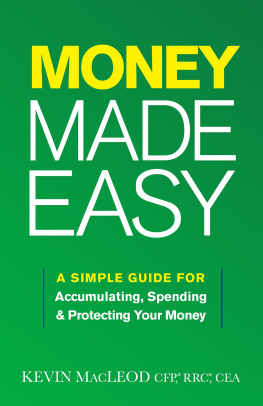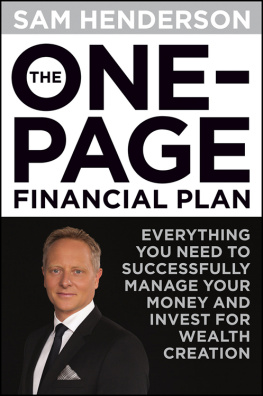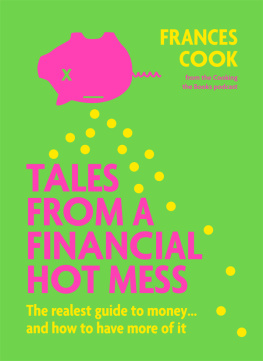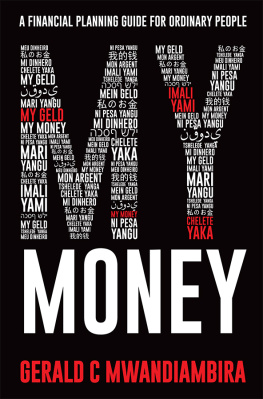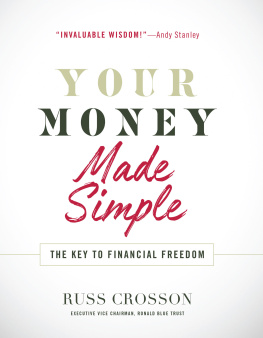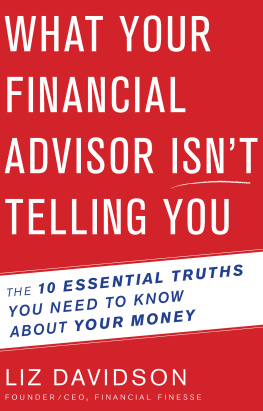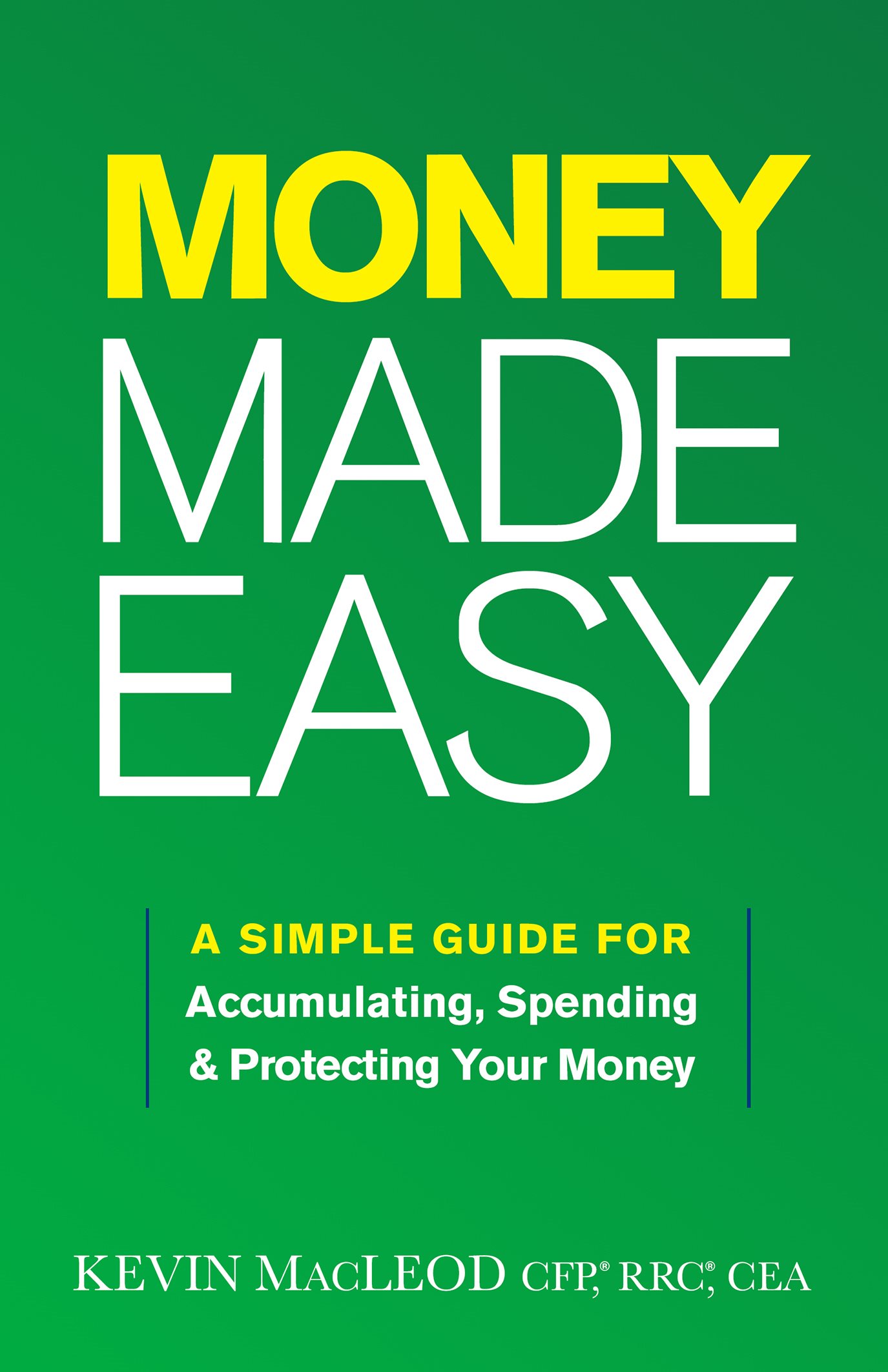Copyright 2022 Kevin MacLeod
All rights reserved.
Money Made Easy
A Simple Guide for Accumulating, Spending & Protecting Your Money
ISBN 978-1-5445- 3284-4 Hardcover
978-1-5445-3282-0 Paperback
978-1-5445-3283-7 Ebook
Contents
Part I:
Making
Money
Chapter 1
Chapter 2
Chapter 3
Chapter 4
Chapter 5
Chapter 6
Chapter 7
Chapter 8
Chapter 9
Chapter 10
Chapter 11
Part II:
Spending
Money
Chapter 12
Chapter 13
Chapter 14
Chapter 15
Chapter 16
Chapter 17
Part III:
Protecting
Your Money
Chapter 18
Chapter 19
Chapter 20
Chapter 21
Chapter 22
Chapter 23
Introduction
C hances are, someone is cheating you out of your money.Without understanding some of the ways that banks, financial institutions, and shady financial advisors operate, you could be paying for products or services that you do not need or want, or that are ticking time bombs.
I recently met a woman in her late twenties who purchased an insurance policy and opened a tax-free savings account from someone calling himself a financial advisor. The insurance policy was sold as a great place to invest her extra money for a rainy day while providing a small amount of life insurance if she died. These products were not the best fit for her. She had no dependents and no real need for life insurance, but even if she did, she could have purchased the life insurance for less than half the cost of this policy. Furthermore, the extra money she deposited into the policy for investment purposes would be quite challenging to get out for a rainy day. She couldnt just withdraw the money. Rather, she would have to borrow money from the policy and then pay it back with interest. She could opt to cancel the policy, but that would mean paying taxes on any gains the investment made. Plus, canceling the policy in the first few years would create a surrender charge that would wipe out the savings in the plan. The only efficient way that her insurance policy would pay out the investment portion would be if she diedso someone else would get the money. That is the purpose of life insurance, not short-term investments.
The tax-free savings account the advisor sold her was an expensive (high-fee) investment fund from an insurance company; he didnt recommend it because it was the best option but because it was all he was licensed to sell. She paid expensive fees for guarantees that she will not use and does not need. There is nothing wrong with the investment, but its the wrong one for her.
These products cost her a lot of moneymoney that she cannot afford to lose. At first, she was embarrassed that she had made these decisions, but then she was outraged. She trusted this person to give her good advice and direction, but this advisor was motivated by the commissions he was earning, not by the help he was giving her.
The problems faced by this young woman are common. Anyone can call themself a financial advisor regardless of their experience or education. For example, a person may be licensed only for life insurance and accident and sickness products. But that person can still call themself a financial advisor. They can even sell some types of investments, regardless of whether they know anything about investments. They can portray themself as knowing how to create and protect wealth when all they may want to do is sell you a complicated life insurance scheme that pays them high commissions. These insurance schemes are ticking time bombs and are usually entirely inappropriate for the average middle-class people who get sucked into them.
However, when you are informed and aware of how banks and bad advisors can take advantage of you, either by not giving you the correct information or by leading you down a financial path of destruction, you will know what to look for, and you can fight back.
With this book, I give you the tools so no one can cheat you out of your money again.
Learn how to tell the difference between a trusted financial advisor and an advisor or bank employee who either does not know what they are doing or, worse, is corrupt or dishonest.
Learn how to maximize your accumulation of assets.
Learn how to spend your money properly.
Learn how to protect your money, property, and income.
Its easy if you know what to do.
Why Should You
Listen to Me?
Let me tell you a story.
When I was in my late twenties, I sold my first business and made a lot of money. I needed advice about what to do with this money, so I went to the bank and asked to speak with a financial advisor. I wanted advice; what I got was a stockbroker. He sold me a stock investment that quickly lost half of its value. Against his advice, I sold it. It would have been worth ten times as much in just a few years if I had kept the investment. The problem was that I had minimal experience with investing, and I did not understand the risk I was taking. The advisor I worked with didnt properly assess the risk that I could tolerate and sold me the wrong investment. The investment was not a bad investment; in fact, it ended up doing very well over time, but I didnt get rewarded because of my behavior.
A few years later I decided to become a financial advisor, to help people create and protect their wealth. While I was very good at running a business, I didnt know much about being a financial advisor. I was recruited by a large insurance company that offered training. I obtained my license to provide investment advice as well as my license to provide insurance advice. I enrolled in the Certified Financial Planner (CFP) program and obtained my designation in 2001. Mark, my trainer at the insurance company, was (is) someone I now call a trusted financial advisor. Mark was all about helping people; he taught me to concentrate on helping people, not on pushing products. He taught me to educate my clients about money and to help them make decisions. My job was to simplify their world, not to sell them on a bunch of complicated products. Mark taught me that the only way to have long-term success in this business is to be a trusted financial advisor. It took me many years to build my business to a point where it could be called successful, but today I am in the top 5 percent of independent financial advisors in Canada. My team and I have helped thousands of people grow their wealth and protect their assets.
Let me help you prevent making the wrong decisions regarding your money. I promise to keep it simple and make it EASY!
What Is a trusted financial
advisor, Anyway?
A trusted financial advisor (TFA) is an individual who has not only taken the training and licensing for providing investments and insurance but also holds (or is in the process of obtaining) a financial planning designation such as Certified Financial Planner (CFP). The most widely recognized financial planning designation in Canada and worldwide, the Certified Financial Planner designation provides assurance to Canadians that the design of their financial future rests with a professional who will put their clients interests ahead of their own. The TFA should also be a member of an industry association that promotes a professional code of conduct that sets out the principles that members are expected to abide by in their business activities and when liaising between clients and suppliers of financial and insurance products or services (associations such as Advocis and the Financial Advisors Association of Canada). A trusted financial advisor is not a designation; it is a way of providing financial advice to clients. A TFA will get to know you and your unique situation, your goals, and your resources to reach those goals and will provide the advice and recommend the products and other services that can help you obtain them.

